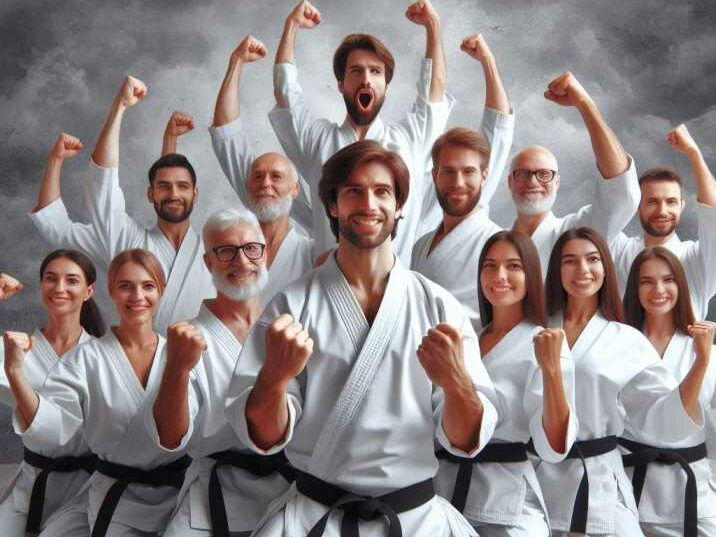Introduction
Table of Contents
In the quest for mental well-being, unconventional paths often reveal themselves as powerful allies. One such unexplored avenue is the intersection of martial arts and mental health. Beyond the physical prowess associated with martial arts lies a transformative journey that can potentially combat the shadows of depression. In this exploration, we delve into the profound connections between the discipline of martial arts and its impact on mental well-being.
The Healing Journey Begins
Martial arts, with its diverse forms like karate, kung fu, and Brazilian jiu-jitsu, offers more than just self-defense techniques. At its core, martial arts is a philosophy that emphasizes discipline, focus, and self-improvement. For individuals grappling with depression, these principles can serve as a guiding light toward recovery.

Discipline as a Pillar of Strength
Depression often robs individuals of a sense of control, leaving them adrift in a sea of despair. Martial arts, however, instills a profound sense of discipline. The structured training routines, repetitive practice, and the pursuit of perfection provide a stable framework that can counteract the chaos within. As practitioners hone their physical skills, they simultaneously cultivate mental resilience.
Focus: A Balm for the Troubled Mind
The mind is a battleground for those combating depression, with negative thoughts and emotions waging a relentless war. Engaging in martial arts demands unwavering focus. Whether executing a precise kick or practicing a complex kata, the practitioner is compelled to be present in the moment. This intense focus can act as a powerful antidote to the persistent mental chatter that characterizes depression.

Empowerment Through Physical Mastery
Depression often leaves individuals feeling powerless, overshadowed by a sense of helplessness. Martial arts, with its progressive mastery levels, offers a tangible path to empowerment. As practitioners witness their physical capabilities evolve, a parallel transformation occurs within their psyche. The newfound strength and resilience cultivated on the training mat can transcend into everyday life, empowering individuals to face their challenges head-on.
The Mind-Body Connection Unveiled
Martial arts inherently encapsulates the mind-body connection, recognizing that mental and physical well-being are intricately linked. Through intentional movement, controlled breathing, and mindfulness practices, practitioners embark on a holistic journey towards equilibrium. This integrated approach aligns with therapeutic strategies for managing depression, emphasizing the importance of addressing both the mind and body in tandem.
The Transformative Elements of Martial Arts
| Element | Impact on Mental Health |
|---|---|
| Discipline | Establishes a sense of control and structure |
| Focus | Counters mental distractions and negative thoughts |
| Empowerment | Fosters a sense of capability and resilience |
| Mind-Body Connection | Promotes holistic well-being |
Conclusion
In the intricate tapestry of mental health, martial arts emerges as a unique thread, weaving discipline, focus, and empowerment into the fabric of well-being. The transformative potential found in the practice of martial arts offers a promising avenue for those grappling with depression. As individuals step onto the training mat, they embark on a journey that transcends physical prowess, unlocking the inner strength needed to combat the shadows within. Through discipline, focus, and empowerment, martial arts stands as a beacon of hope, inviting individuals to rediscover their resilience and reclaim their mental well-being.
By embracing the philosophy and practices of martial arts, individuals can forge a path towards mental fortitude, cultivating a resilient spirit that transcends the challenges of depression. The journey is not merely physical but a profound exploration of the self, guided by the principles of martial arts—a journey that illuminates the possibility of a brighter, empowered future.

FAQs: Answering Your Questions
Q1: Can martial arts really help with depression? A: Yes, the discipline, focus, and empowerment inherent in martial arts can positively impact mental health, providing a unique avenue for individuals facing depression.
Q2: Which martial art is best for mental health? A: The effectiveness varies, but arts like Tai Chi, Aikido, and Brazilian jiu-jitsu are often praised for their meditative and therapeutic qualities.
Q3: How long does it take to see mental health benefits from martial arts? A: Results vary, but many practitioners report improvements in mood and mental well-being after a few weeks of consistent practice.
Q4: Can martial arts replace traditional therapy for depression? A: While martial arts can complement therapy, it’s not a substitute. Consult with a mental health professional for a comprehensive approach.
Q5: Are there specific techniques within martial arts for mental health? A: Mindfulness, breathing exercises, and kata practice are integral techniques within martial arts that contribute to mental well-being.
Q6: Is martial arts suitable for everyone dealing with depression? A: It depends on individual circumstances. Consult with a healthcare professional before starting any new physical activity, especially for those with pre-existing health conditions.
Q7: How can one incorporate martial arts into a holistic mental health plan? A: Integrate martial arts alongside therapy, medication, and other self-care practices. Customize the approach based on personal needs and preferences.


